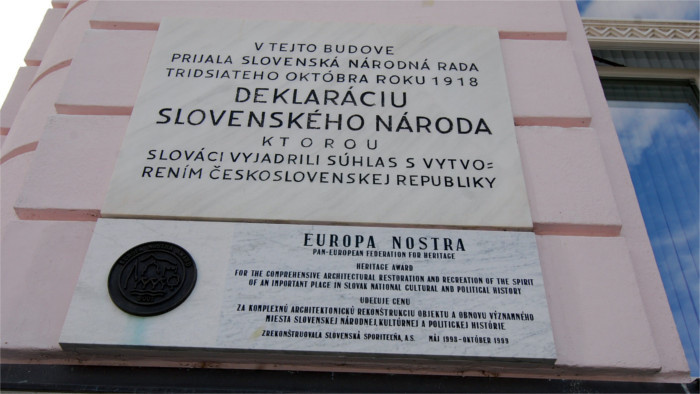On Wednesday, October 30, 106 years will have passed since the adoption of the Declaration of the Slovak Nation, also known as the Martin Declaration. The declaration was adopted at the assembly in Martin two days after the first Czechoslovak Republic (ČSR) was established in Prague on October 28, 1918, based on the law of the Czechoslovak National Committee. With the declaration, the Slovaks clearly signed up for a joint state union with the Czechs.
The event of the adoption of the declaration has been commemorated in the Slovak Republic (SR) since 1993 as a memorial day - the Anniversary of the Declaration of the Slovak Nation. In 2018, on the occasion of the 100th anniversary of the adoption of the declaration, October 30 was celebrated as a national holiday.
According to President Pellegrini the Martin Declaration is also an inspiration for present-day Slovakia. "The Martin Declaration is one of those rare historical moments that today's sadly divided Slovak society must be inspired by if it ever wants to overcome this division," the President emphasized. At the same time, he drew attention to the fact that dozens of personalities of different faiths, different political orientations, different personalities and worldviews agreed on the adoption of the Declaration of the Slovak Nation.
On October 30, 1918, more than 200 representatives of political and social life in Slovakia met in Turčianske sv. Martin in the Tatrabanka building. The participants of the meeting accepted the draft of the declaration, which was prepared by the evangelical priest, politician and religious writer Samuel Zoch. At the suggestion of Matúš Dula, they also completed the creation of the Slovak National Council (SNR), to which they elected 25 members headed by a 12-member executive committee. In the name of the SNR, they adopted the Declaration of the Slovak Nation.
The text of the declaration unequivocally rejected the right of the Hungarian government to act on behalf of the Slovak nation, and the SNR designated itself as the only authorized representative to act on behalf of the Slovak nation. The declaration demanded the right to self-determination of the Slovak nation on the basis of complete independence, as well as the conclusion of an immediate peace.
The content of the declaration also expressed the idea of a joint state of Slovaks and Czechs. In it, Slovakia's union with Hungary was officially canceled and a new union with the Czech nation was confirmed. The Declaration of the Slovak Nation, or the Martin Declaration, thus became one of the underlying documents of the birth of the Czecho-Slovak state and contributed to its constitution.
However, paradoxically, the participants of the Martin assembly did not have information about what happened in Prague on October 28, 1918. Milan Hodža, arriving from Budapest, informed the executive committee of the SNR about the creation of Czechoslovakia in the evening. He also informed them that Austria-Hungary had unconditionally capitulated.
Based on this current information, the wording of the declaration was modified. The demand for independent representation of the Slovaks at the peace conference was dropped, since the foreign policy representation of both nations fell to the Czechoslovak Republic. The text was also supplemented by the fact that the Austro-Hungarian Minister of Foreign Affairs Július Andráši (Gyula Andrassy) recognized the demands of the President of the United States of America Woodrow Wilson from October 18, 1918.
Source: TASR

